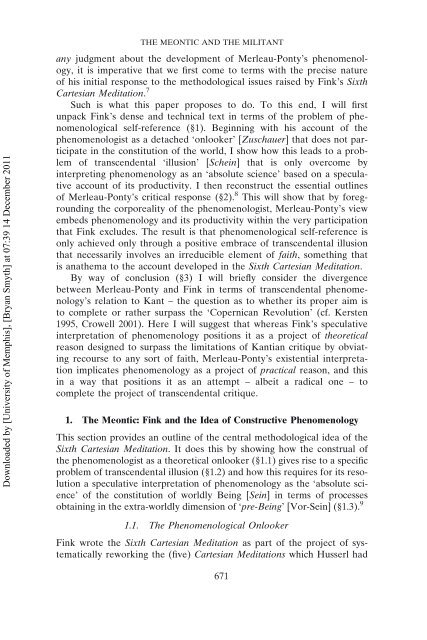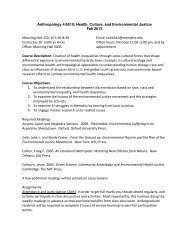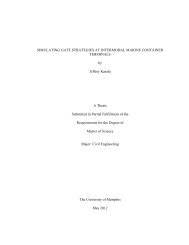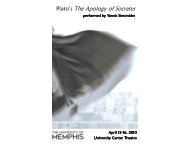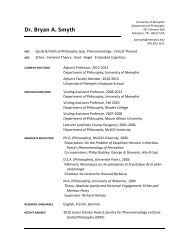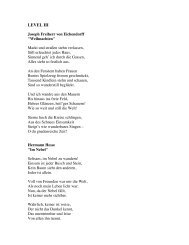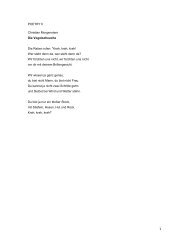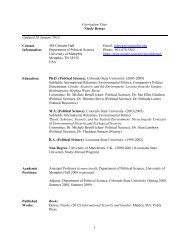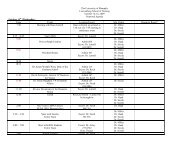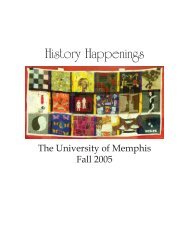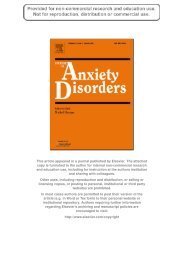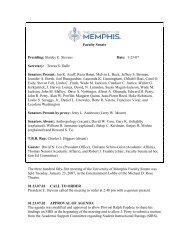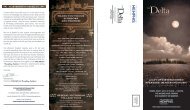The Meontic and the Militant - University of Memphis
The Meontic and the Militant - University of Memphis
The Meontic and the Militant - University of Memphis
You also want an ePaper? Increase the reach of your titles
YUMPU automatically turns print PDFs into web optimized ePapers that Google loves.
Downloaded by [<strong>University</strong> <strong>of</strong> <strong>Memphis</strong>], [Bryan Smyth] at 07:39 14 December 2011<br />
THE MEONTIC AND THE MILITANT<br />
any judgment about <strong>the</strong> development <strong>of</strong> Merleau-Ponty’s phenomenology,<br />
it is imperative that we first come to terms with <strong>the</strong> precise nature<br />
<strong>of</strong> his initial response to <strong>the</strong> methodological issues raised by Fink’s Sixth<br />
Cartesian Meditation. 7<br />
Such is what this paper proposes to do. To this end, I will first<br />
unpack Fink’s dense <strong>and</strong> technical text in terms <strong>of</strong> <strong>the</strong> problem <strong>of</strong> phenomenological<br />
self-reference (§1). Beginning with his account <strong>of</strong> <strong>the</strong><br />
phenomenologist as a detached ‘onlooker’ [Zuschauer] that does not participate<br />
in <strong>the</strong> constitution <strong>of</strong> <strong>the</strong> world, I show how this leads to a problem<br />
<strong>of</strong> transcendental ‘illusion’ [Schein] that is only overcome by<br />
interpreting phenomenology as an ‘absolute science’ based on a speculative<br />
account <strong>of</strong> its productivity. I <strong>the</strong>n reconstruct <strong>the</strong> essential outlines<br />
<strong>of</strong> Merleau-Ponty’s critical response (§2). 8 This will show that by foregrounding<br />
<strong>the</strong> corporeality <strong>of</strong> <strong>the</strong> phenomenologist, Merleau-Ponty’s view<br />
embeds phenomenology <strong>and</strong> its productivity within <strong>the</strong> very participation<br />
that Fink excludes. <strong>The</strong> result is that phenomenological self-reference is<br />
only achieved only through a positive embrace <strong>of</strong> transcendental illusion<br />
that necessarily involves an irreducible element <strong>of</strong> faith, something that<br />
is ana<strong>the</strong>ma to <strong>the</strong> account developed in <strong>the</strong> Sixth Cartesian Meditation.<br />
By way <strong>of</strong> conclusion (§3) I will briefly consider <strong>the</strong> divergence<br />
between Merleau-Ponty <strong>and</strong> Fink in terms <strong>of</strong> transcendental phenomenology’s<br />
relation to Kant – <strong>the</strong> question as to whe<strong>the</strong>r its proper aim is<br />
to complete or ra<strong>the</strong>r surpass <strong>the</strong> ‘Copernican Revolution’ (cf. Kersten<br />
1995, Crowell 2001). Here I will suggest that whereas Fink’s speculative<br />
interpretation <strong>of</strong> phenomenology positions it as a project <strong>of</strong> <strong>the</strong>oretical<br />
reason designed to surpass <strong>the</strong> limitations <strong>of</strong> Kantian critique by obviating<br />
recourse to any sort <strong>of</strong> faith, Merleau-Ponty’s existential interpretation<br />
implicates phenomenology as a project <strong>of</strong> practical reason, <strong>and</strong> this<br />
in a way that positions it as an attempt – albeit a radical one – to<br />
complete <strong>the</strong> project <strong>of</strong> transcendental critique.<br />
1. <strong>The</strong> <strong>Meontic</strong>: Fink <strong>and</strong> <strong>the</strong> Idea <strong>of</strong> Constructive Phenomenology<br />
This section provides an outline <strong>of</strong> <strong>the</strong> central methodological idea <strong>of</strong> <strong>the</strong><br />
Sixth Cartesian Meditation. It does this by showing how <strong>the</strong> construal <strong>of</strong><br />
<strong>the</strong> phenomenologist as a <strong>the</strong>oretical onlooker (§1.1) gives rise to a specific<br />
problem <strong>of</strong> transcendental illusion (§1.2) <strong>and</strong> how this requires for its resolution<br />
a speculative interpretation <strong>of</strong> phenomenology as <strong>the</strong> ‘absolute science’<br />
<strong>of</strong> <strong>the</strong> constitution <strong>of</strong> worldly Being [Sein] in terms <strong>of</strong> processes<br />
obtaining in <strong>the</strong> extra-worldly dimension <strong>of</strong> ‘pre-Being’ [Vor-Sein] (§1.3). 9<br />
1.1. <strong>The</strong> Phenomenological Onlooker<br />
Fink wrote <strong>the</strong> Sixth Cartesian Meditation as part <strong>of</strong> <strong>the</strong> project <strong>of</strong> systematically<br />
reworking <strong>the</strong> (five) Cartesian Meditations which Husserl had<br />
671


